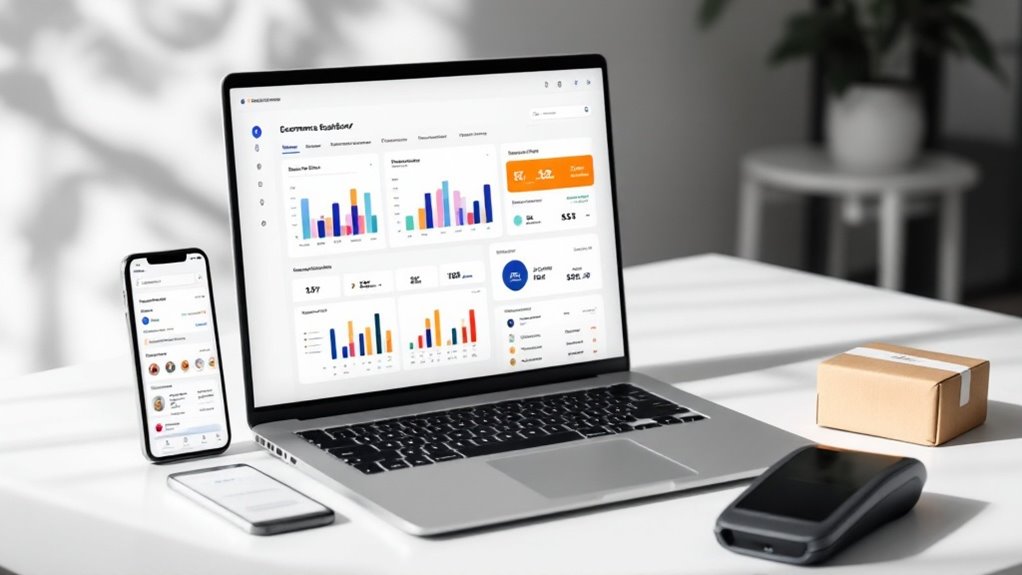Ecommerce software provides businesses with digital tools to sell products and services online. These platforms combine essential features like shopping carts, payment processing, and inventory management into user-friendly systems that streamline operations. Modern solutions offer various deployment options, from cloud-based services to self-hosted platforms, each with distinct advantages. The software automates vital tasks, reduces operational costs, and enhances customer experience through integrated marketing and analytics tools. Understanding its core components reveals the full potential of online retail success.
Quick Overview
- E-commerce software is a digital platform that enables businesses to sell products and services online through a virtual storefront.
- It includes essential features like shopping carts, payment processing, and inventory management to facilitate online transactions.
- The software streamlines business operations by automating checkout processes, order fulfillment, and customer data management.
- Different types include SaaS platforms, PaaS solutions, and open-source systems, each offering varying levels of customization and control.
- Built-in marketing tools, SEO capabilities, and analytics help businesses increase sales and improve customer engagement.
Understanding the Core Elements of ECommerce Software

The digital marketplace has transformed how businesses connect with customers, making ecommerce software the backbone of modern online retail operations. At its core, this technology integrates several essential elements that work together seamlessly to facilitate online transactions.
The fundamental components of ecommerce software include shopping cart functionality for easy product selection, secure payment processing systems, and robust inventory management tools. These elements combine with efficient order fulfillment processes to create a smooth customer experience.
Successful ecommerce platforms seamlessly integrate shopping, payment, and inventory systems to deliver an effortless purchasing journey for customers.
Modern platforms also incorporate advanced features like SEO capabilities and customer engagement tools to enhance online visibility and build lasting relationships.
Different types of ecommerce software, from SaaS to on-premise solutions, offer varying levels of control and customization. Each solution empowers businesses to manage their digital storefronts effectively while meeting specific operational needs and growth objectives. Popular platforms like Shopify and BigCommerce provide comprehensive solutions that emphasize mobile compatibility and scalable growth potential.
Types of ECommerce Platforms and Their Key Differences
When businesses venture into online retail, selecting the right e-commerce platform becomes an essential decision that shapes their digital success. Online businesses can choose from several distinct platform types, each offering unique advantages.
Software as a Service provides cloud-hosted solutions ideal for companies seeking low-maintenance options, while Platform as a Service enables developers to build customized experiences.
Large enterprises often opt for headless e-commerce software, which separates front-end and back-end systems for maximum flexibility across channels. Open-source solutions offer extensive customization options but require technical expertise to implement.
Self-hosted software provides complete control over data and security, though it demands higher maintenance resources.
The choice between these ecommerce platforms depends on specific business requirements, technical capabilities, and long-term growth objectives.
Essential Features That Drive Online Store Success

Successful online stores rely on a core set of essential features that work together to create seamless shopping experiences. Modern ecommerce software integrates vital components like user-friendly website builders, automated checkout processes, and robust inventory tracking systems to drive online store success. These features work harmoniously to enhance the customer experience while streamlining operations for store owners. Order management systems provide real-time monitoring and smart routing capabilities to optimize the entire fulfillment process.
| Feature Category | Business Impact |
|---|---|
| Website Builder | Enables custom design without technical expertise |
| Checkout System | Reduces cart abandonment, increases conversions |
| Marketing Tools | Drives traffic through SEO and email campaigns |
| Payment/Shipping | Provides multiple payment options and reliable fulfillment |
The combination of these essential features empowers businesses to create professional online stores that effectively manage inventory, process transactions, and deliver exceptional shopping experiences to their customers.
How ECommerce Software Transforms Business Operations
Modern ecommerce software revolutionizes how businesses operate by transforming manual processes into streamlined digital workflows. Through advanced automation, it handles critical business operations from inventory management to customer interactions with remarkable efficiency.
The software’s integrated approach centralizes payment processing and data management, giving businesses clear visibility into their operations. Marketing tools within these platforms enable targeted customer engagement, while automated checkout systems enhance the overall customer experience.
The technology’s scalability guarantees businesses can grow without major operational disruptions. The transformation is particularly evident in operational efficiency gains. Tasks that once required hours of manual work now happen automatically, allowing businesses to focus on growth strategies.
This digital evolution in business operations leads to reduced costs, improved accuracy, and enhanced customer satisfaction. Leading platforms like Shopify and NetSuite provide comprehensive inventory management solutions that integrate seamlessly with existing business systems.
Choosing the Right ECommerce Solution for Your Business

Selecting the ideal ecommerce solution requires careful examination of a business’s unique needs and goals. When choosing ecommerce software, companies must consider essential features like payment processing, marketing tools, and integration capabilities that align with their operational requirements.
- Start by evaluating business needs and identifying the specific features you need, such as inventory tracking, online payments, and customer management tools.
- Test multiple platforms through free trials to gauge user-friendliness and functionality.
- Analyze pricing structures, including monthly fees and transaction costs, to guarantee the solution fits within budget constraints.
- Compare scalability options and review customer feedback to determine long-term viability and reliability of potential platforms.
This systematic approach helps businesses select an ecommerce solution that supports both current operations and future growth potential. Custom ecommerce platforms provide maximum flexibility and control over your online store’s functionality while eliminating recurring subscription fees.
Maximizing ROI With Ecommerce Software Tools
Once a business has implemented the right ecommerce platform, turning attention to maximizing its return on investment becomes the next strategic focus.
Ecommerce software offers multiple pathways to boost ROI through various integrated tools and features.
Advanced marketing features and A/B testing can increase conversion rates by up to 25%, while built-in SEO tools help improve search visibility by 20%.
The software’s analytics capabilities enable businesses to track customer behavior and make data-driven decisions, potentially increasing revenue by 10-15%.
Streamlined checkout processes greatly reduce cart abandonment rates, leading to higher sales completion.
Additionally, automation of key operations through ecommerce software can cut operational costs by 30%.
Personalization software solutions further enhance ROI by delivering tailored shopping experiences through AI-driven product recommendations and dynamic pricing.
This combination of increased revenue and reduced expenses creates a powerful formula for maximizing ROI in the digital marketplace.
Frequently Asked Questions
What Is Ecommerce Software Used For?
Ecommerce software serves as a thorough digital toolkit for managing online business operations. It enables merchants to process secure payments, track inventory levels, and handle order fulfillment efficiently.
The software streamlines customer transactions through shopping cart functionality, automates shipping processes, and provides marketing tools for business growth. Additionally, it offers analytics capabilities to monitor sales performance and customer behavior, helping businesses make data-driven decisions to optimize their online presence.
What Is E-Commerce, for Example?
Just as a traditional marketplace brings buyers and sellers together under one roof, e-commerce creates a digital bazaar where transactions happen online.
Common examples include Amazon’s vast marketplace for retail goods, Spotify’s streaming music service, and Airbnb’s accommodation rentals.
E-commerce also encompasses digital services like online banking, subscription-based platforms like Netflix, and specialized marketplaces such as Etsy for handcrafted items.
Each platform serves specific consumer needs through internet-based transactions.
What Is an Ecommerce Program?
An ecommerce program is a specialized software tool that helps businesses sell products and services online.
It manages essential tasks like displaying products, processing payments, and tracking inventory. Think of it as a digital storefront that handles everything from showcasing items to completing sales transactions.
These programs range from simple shopping cart systems to extensive platforms that can manage multiple sales channels, marketing campaigns, and customer relationships.
Which Software Is Best for Ecommerce?
Like choosing a trusty steed for your digital marketplace journey, selecting the best ecommerce software depends on specific business needs.
For small businesses and beginners, Shopify stands out with its user-friendly interface and extensive features.
WooCommerce offers excellent flexibility for WordPress users, while BigCommerce suits growing enterprises.
Established businesses might prefer Adobe Commerce’s robust customization options.
Each platform has unique strengths, making the “best” choice dependent on individual requirements and technical expertise.
Conclusion
ECommerce software empowers businesses to sell online, streamlines operations, and enhances customer experiences. From robust enterprise platforms to user-friendly small business solutions, these tools transform digital commerce through automated inventory management, secure payment processing, and data-driven insights. By carefully selecting and implementing the right ecommerce software, businesses can build thriving online stores, reach global markets, and achieve sustainable growth in today’s digital marketplace.








